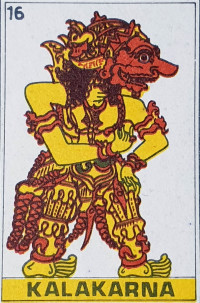Wayang Kalakarna
A Misunderstood Anti-Hero in the Javanese Shadow Play.
In the vast and intricate world of wayang kulit (Javanese shadow puppet theater), Kalakarna stands out as a complex and often contradictory figure. He is a raksasa (giant), traditionally associated with chaotic forces, yet possesses surprising wisdom and courage in the face of injustice. Let's dive into the story and significance of Wayang Kalakarna.

Origins and Appearance
Kalakarna is the son of Bathara Kartinea, a lesser god, and Bathari Durga, goddess of death. His unusual ancestry results in a distinct appearance: part human, part beast. He walks upright like a human, while his coarse features and sharp fangs reflect his raksasa heritage.
His Kingdom: Awangga
Kalakarna rules the kingdom of Awangga, inhabited by other giants. Yet, unlike many raksasas, he desires peace and opposes the impulsive ways of his brethren. His character often becomes a source of tension within his own kingdom.
A Quest for Beauty
A defining event in Kalakarna's story is his attempt to win the hand of Dewi Surtikanti, daughter of King Salya. The king imposes a near-impossible condition – Kalakarna must present two magical pusaka (heirlooms) as wedding gifts. This triggers a journey filled with trials and self-discovery.
A Voice of Reason Amid War
During the climactic Kurukshetra War between the Pandawa and Kurawa clans, Kalakarna joins the Pandawa side, swayed by their righteousness. Despite his fearsome reputation, he repeatedly acts as a wise counselor, providing a unique perspective during strategic discussions.
Tragic Fate
In a heart-wrenching twist, Kalakarna meets his end at the hands of Basukarna (also known as Suyaputra), one of the Pandawa brothers. Due to mistaken identities and the chaos of battle, Basukarna believes Kalakarna has slain Gatotkaca, his beloved son. In grief and vengeance, Basukarna kills Kalakarna.
Symbolism and Deeper Meaning
Wayang Kalakarna invites us to challenge simplified notions of good and evil. He demonstrates that appearances can be deceiving, and even those traditionally categorized as antagonists can embody noble qualities. His unwavering loyalty and principled stances highlight the multi-faceted nature of morality within the wayang lore.
Last updated